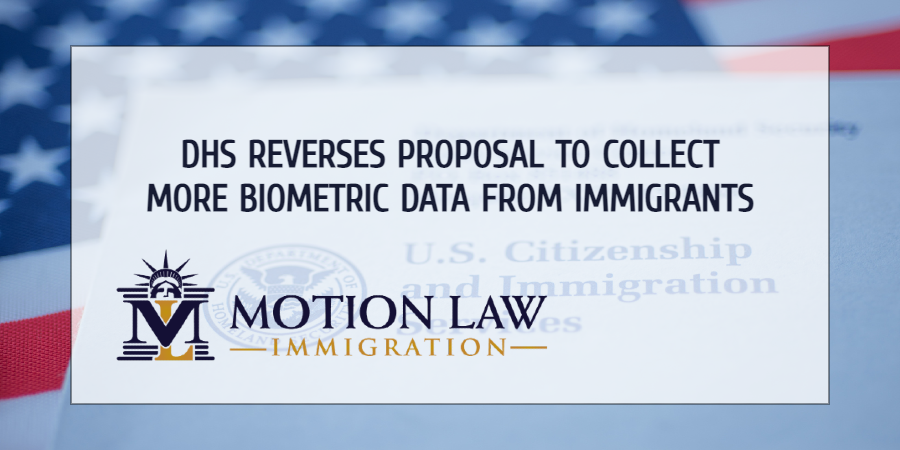DHS Reverses Proposal to Collect More Biometric Data from Immigrants

DHS refuses to collect more biometric data from immigrants
On Monday, May 10, 2021, Biden’s DHS (Department of Homeland Security) officially withdrew a rule proposed by the Trump administration to collect more biometric data from almost anyone involved in an immigration process, including American citizens.
This decision is part of a series of changes by the Biden administration on the immigration system, which seek to remove restrictive policies implemented by the previous administration and promote comprehensive immigration overhaul.
Do you want to come to the US, but don’t know how? Or do you need to complete a pending immigration process within the country? Either way, the best recommendation is to follow the advice of experts, especially now that multiple immigration programs are changing. Contact Motion Law Immigration, schedule a FREE Consultation and follow the advice of our experienced attorneys!
What was Trump’s biometric data proposal?
In early September 2020, the Trump administration published a Notice of Proposed Rulemaking, which, broadly speaking, intended to increase the scenarios in which certain entities could collect biometric data during immigration processes and, in several cases, increased the amount of biometric data required.
According to Trump’s proposal:
- Agencies such as USCIS (US Citizenship and Immigration Services), ICE (Immigration and Customs Enforcement) and CBP (Customs and Border Protection) would have the power to collect biometric data if necessary under this rule.
- Apart from requesting basic personal information and regular biometric data such as fingerprints, these federal entities could collect DNA samples, voice printing, face photographs, eye scans, inter alia.
When the Trump administration published this rule in the Federal Register, it received more than 5,000 comments and several activist groups tried to intervene, through legal processes, to prevent it from officially implementing it.
According to the opinion of immigrant rights advocates, this proposal would substantially change biometric collection practices of agencies in charge of reviewing immigration applications and enforcing immigration law both at the borders and within the US, which would lengthen existing processes and be an extremely invasive approach to the immigration sector.
The DHS decision might expedite pending immigration processes
Many of Trump’s policies substantially restricted immigration, lengthened waiting times and narrowed opportunities for the most vulnerable immigrant communities. Adding to that, the global Coronavirus pandemic also contributed to his administration being able to further reduce immigration levels in the US.
Therefore, there is currently a rather alarming backlog of immigration cases and it is important for the Biden administration to find ways to expedite processes and reduce waiting times.
Having said that, it is possible that the DHS decision to withdraw Trump’s proposal to collect more biometric data will allow the Biden administration to reduce the backlog of pending immigration cases.
Know your options before starting your immigration process!
The vast experience of our team has taught us that the US’ immigration system is quite extensive and there are programs and options more used or known than others, but it does not mean that they are more important.
Therefore, to know all the alternatives available for your particular case, it would be better to follow the advice of professionals in immigration matters, who know in depth the local immigration system and will be able to guide you towards the success of your application.
If you, a family member, or a friend need help with an immigration case, please contact Motion Law today to schedule a FREE Consultation with one of our expert immigration attorneys. Our team will be happy to guide you through your immigration journey in the US.
Please contact Motion Law Immigration today at: (202) 918-1799.
